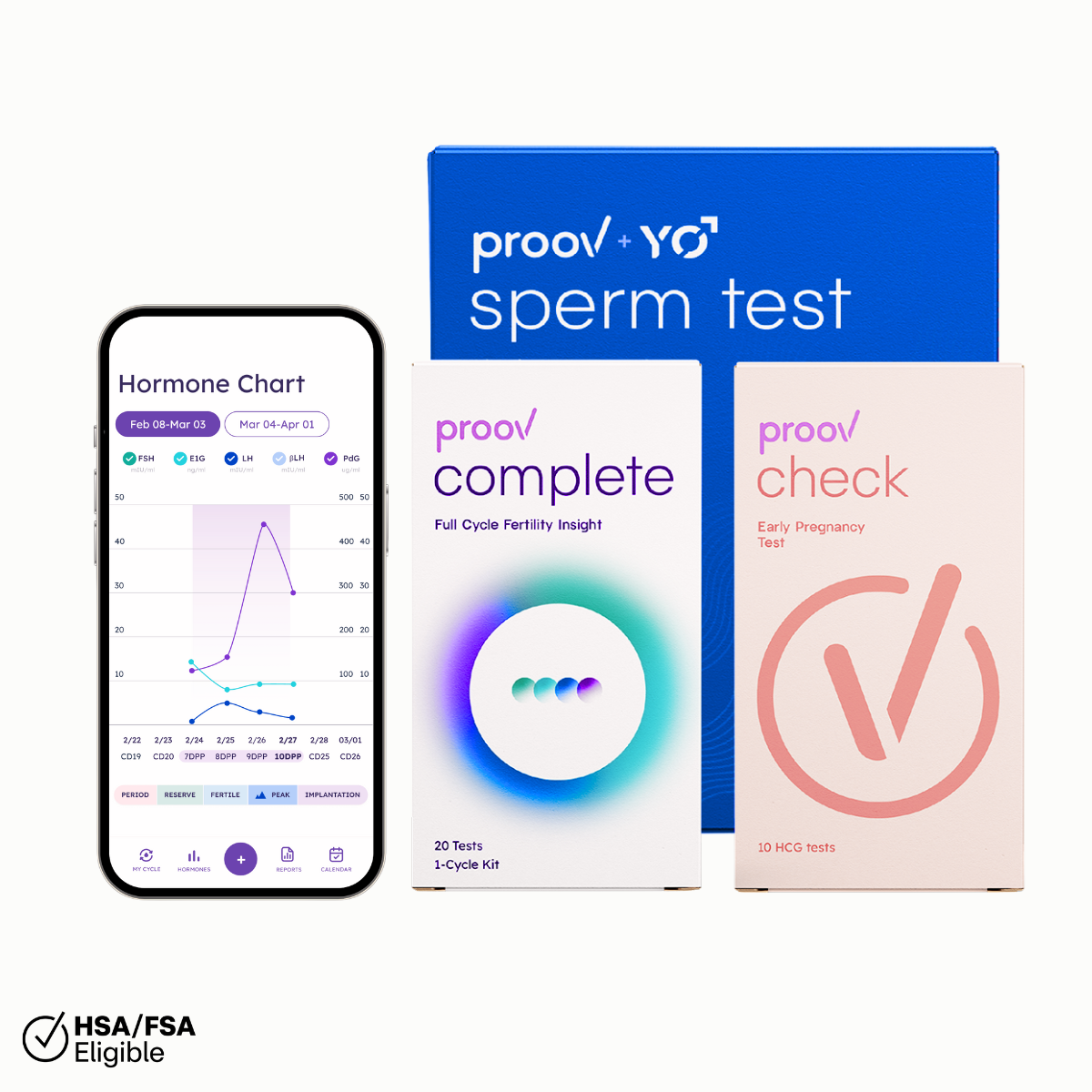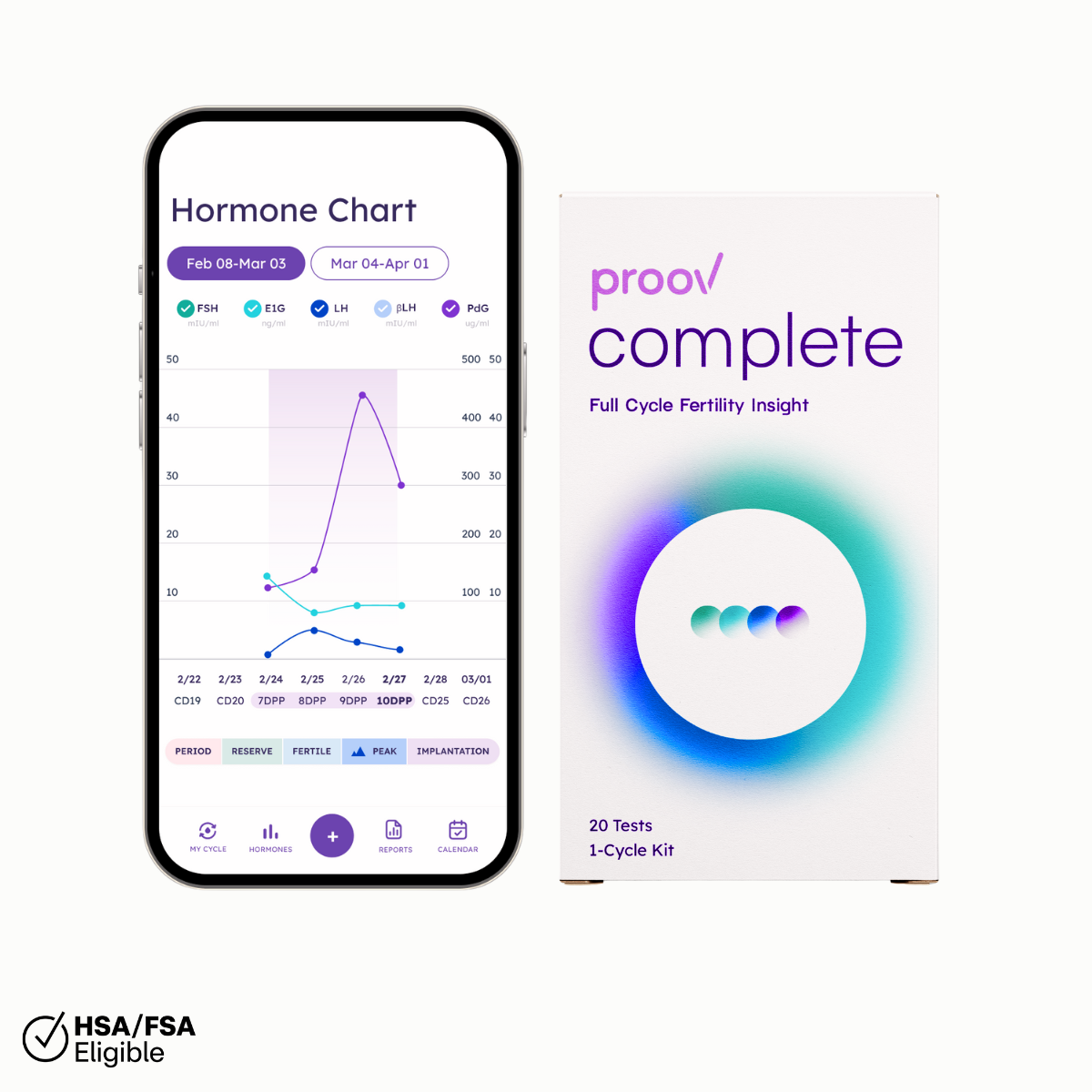Written by: Dr. Amy Beckley, PhD, Founder and Inventor of the Proov test — the first and only FDA-cleared test to check for successful ovulation at home.
Written on: 3/23/22

Keep scrolling to learn more about the key factors to look for in ovulation tests!
There are multiple names that are synonymous with ovulation test kits: ovulation predictor kits, OPK’s, and also LH (luteinizing hormone) tests. These all do the same thing; they tell you when is the best time to have sex in order to conceive. They measure your LH which is very important to those that are trying to conceive.
Since there are so many different names for ovulation predictor test kits, one can guess that there are also so many different types on the market. But, what makes a test good? Let’s discuss more about what you should be looking for in an ovulation test kit.
What are ovulation test kits and why are they important?
In a woman’s cycle, there are 4 different parts. Your period, the follicular phase, ovulation, and the luteal phase. When you want to get pregnant it’s especially important to know about your cycle. This is because there is only a short window of 12-24 hours ovulation where the egg is released, can stay alive, and has the time to be fertilized by sperm.
During ovulation, the ovary will release an egg, and if it’s met with a sperm – which can stay alive for up to 5 days within the female reproductive tract waiting – then they can join together to possibly create an embryo. It’s very important to time intercourse before ovulation because of the fact that sperm can stay alive for a while before ovulation, giving fertilization the best chance to occur during the egg’s short life.
Trying to figure out this timing doesn’t have to be a mystery; in fact, this is where an ovulation test comes in. Ovulation tests use urine to measure the amount of hormones that are present, specifically the luteinizing hormone. This hormone is released by the pituitary gland and triggers ovulation.
In order to find your LH surge – which is typically 12-36 hours before ovulation – some women decide to test twice a day. This means once in the morning and once at night. This is because LH surges can sometimes be very short and you don’t want to miss it.
An ovulation test, therefore, is used to predict your two most fertile days. Ovulation occurs midway through your cycle – which may last anywhere from 21-35 days. If you’re unsure about your cycle length and want to make sure you are covered, you can start using an LH test right after your period ends. While you may have heard ovulation calculators, we don’t typically recommend them because they don’t test your hormones to tell you when you are ovulating and therefore can be less accurate.
Ovulation test kits are very important if you want to start understanding more about your cycle, and if you’re trying to get pregnant.

Ovulation tests use urine to measure the amount of hormones there are present, specifically the luteinizing hormone.
What are the different types of ovulation test kits?
Not only are there different brands of ovulation kits, there are also different types that measure more than just LH. Measuring multiple hormones rather than just one can give you a complete picture of your ovulation and overall cycle health. Keep reading to learn more!
LH test only
All traditional ovulation tests will measure luteinizing hormone. An ovulation test that only measures LH however is solely a predictor of ovulation – nothing else.
The benefit of this type of test is that you only learn about when you’re going to ovulate by predicting your two most fertile days. If you don’t need any more information, then there’s no need to test other hormones.
Using Proov’s Predict test allows you to detect LH in the urine so that you know the best time to have sex if you are trying to conceive.
E1G test and LH test
An ovulation test kit can also measure E1G (estrogen marker) along with LH; E1G is also called the urine metabolite of estrogen. E1G helps predict the longest fertile window because estrogen starts to rise even before LH as the ovary prepares an egg for ovulation. Using an E1G and LH test together can help find the longest fertile window - up to 6 fertile days - and your two most fertile days, giving you even more time to “try.”

E1G can help you determine your longest possible fertile window.
LH test and PdG test
Another type of ovulation test kit is one that measures both LH and PdG. PdG, or pregnanediol glucuronide, is the urine marker of progesterone. Progesterone is also called the pregnancy hormone, so that means that it is super important for conception.
Progesterone is the hormone that is released directly after ovulation. This means that if you test your PdG, the urine metabolite of progesterone, then you can see not only if you did ovulate but also the quality of your ovulation.
The quality of your ovulation relates to tracking PdG during the implantation window after ovulation. You want levels to be elevated throughout the window to signal a high quality ovulation. While it is possible to get pregnant in any cycle when ovulation occurs, the chance of successfully conceiving is higher when ovulation is high quality. Testing to see if you ovulated after is important because although LH tests predict ovulation, they don’t tell you if it actually occurred (contrary to popular belief!).
LH and PdG tests work together like yin and yang – one predicts ovulation and the other confirms ovulation. Together they form a puzzle that can tell you everything you need to know about your ovulation, especially if you’re TTC, it can tell you if implantation is able to occur.
E1G, LH, and PdG test
If you’re looking for all the information about your ovulation, then test all the main hormones! By testing the estrogen marker, progesterone marker, and LH you provide yourself with the most information regarding your fertile window, and the quality of your ovulation.

LH and PdG tests work together like yin and yang – one predicts ovulation and the other confirms it.
What should I be looking for in ovulation test kits?
Everything that you’re looking for in an ovulation test kit simply depends on how much information that you want to know – it’s all preference!
In order to ensure that you are ovulating, the best course of action would be to use an ovulation predictor test that not only predicts ovulation but confirms it too. Since LH doesn’t tell you if you ovulated because it only predicts, it may be beneficial to try and figure out the other side of the puzzle. If you decide to only take an LH test and never a PdG test, then you may not miss a problem with ovulation, which can make it more difficult to conceive.
Using both an LH and PdG test is easy to do and will provide you with information from both sides of ovulation. The Proov Predict & Confirm Kit gives you the best idea of what kind of ovulation you had - high quality or likely no ovulation. If you are trying to conceive, make sure to know everything that’s happening in your body!
Want more information? Try Complete!
The Complete kit is the best way to learn about all 4 key cycle hormones!
If you want the most amount of information about your ovulation as possible, then head over to the Complete kit! Not only does this kit measure E1G, PdG, and LH, it also measures your FSH. This hormone gives you an idea of the amount of eggs left in your ovarian reserve. With the Complete kit, you can:
- Understand ovarian reserve
- Find up to 6 fertile days
- Identify the 2 most fertile days
- Check for successful ovulation
Ovulation test kits can provide you with the amount of information that best suits you, your lifestyle, and learning techniques! Each different type of kit can prepare you for ovulation in its own unique way.














